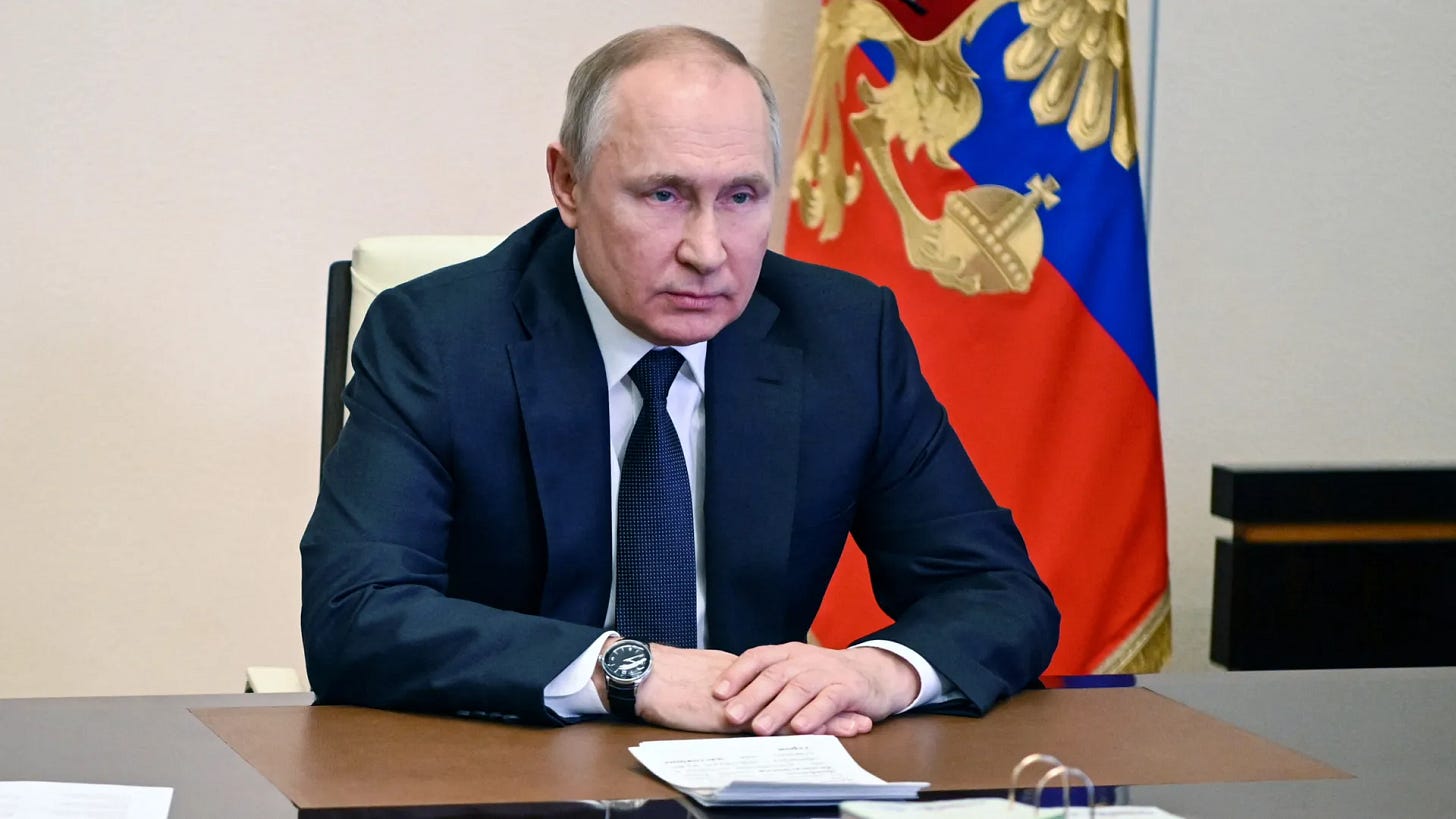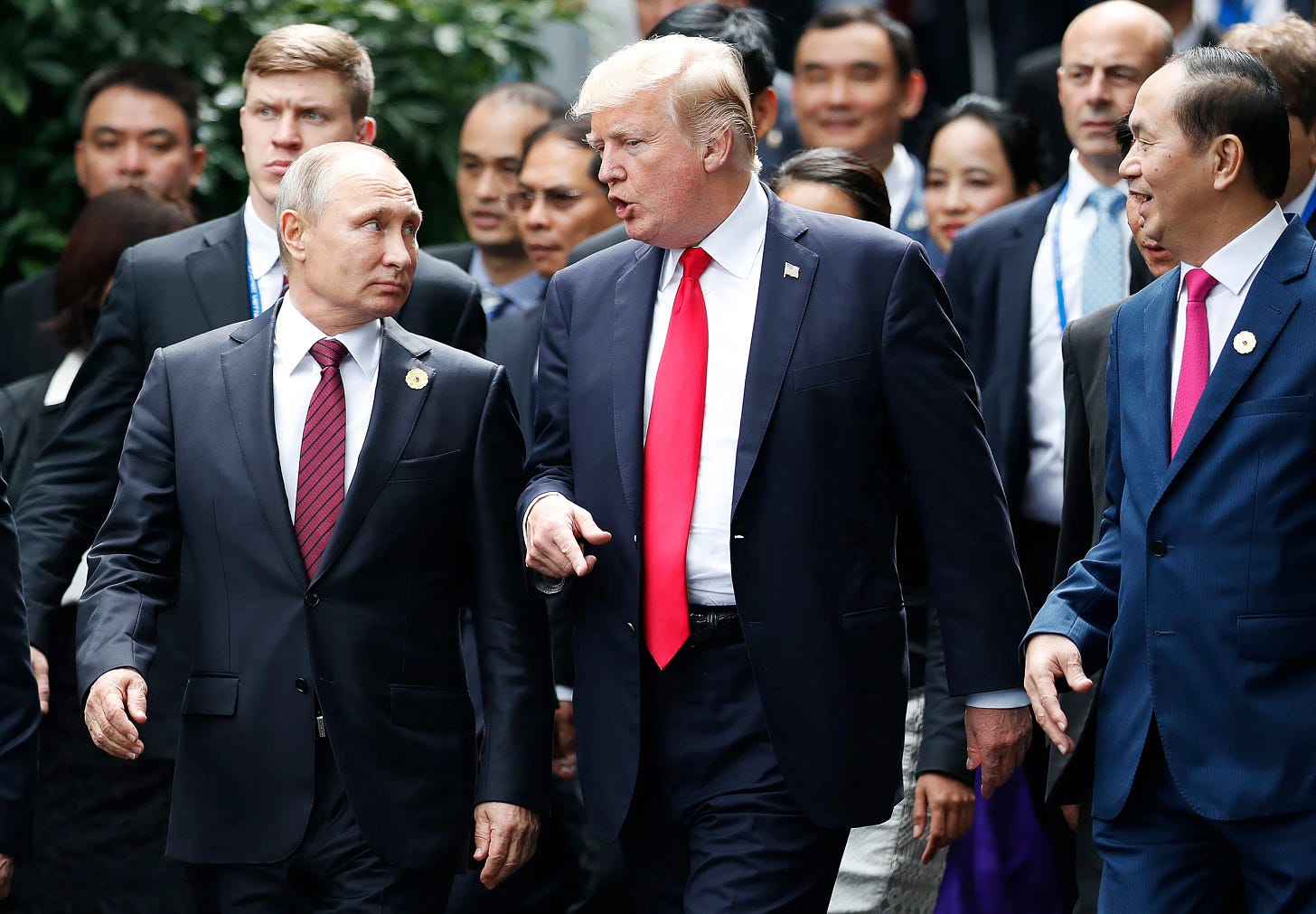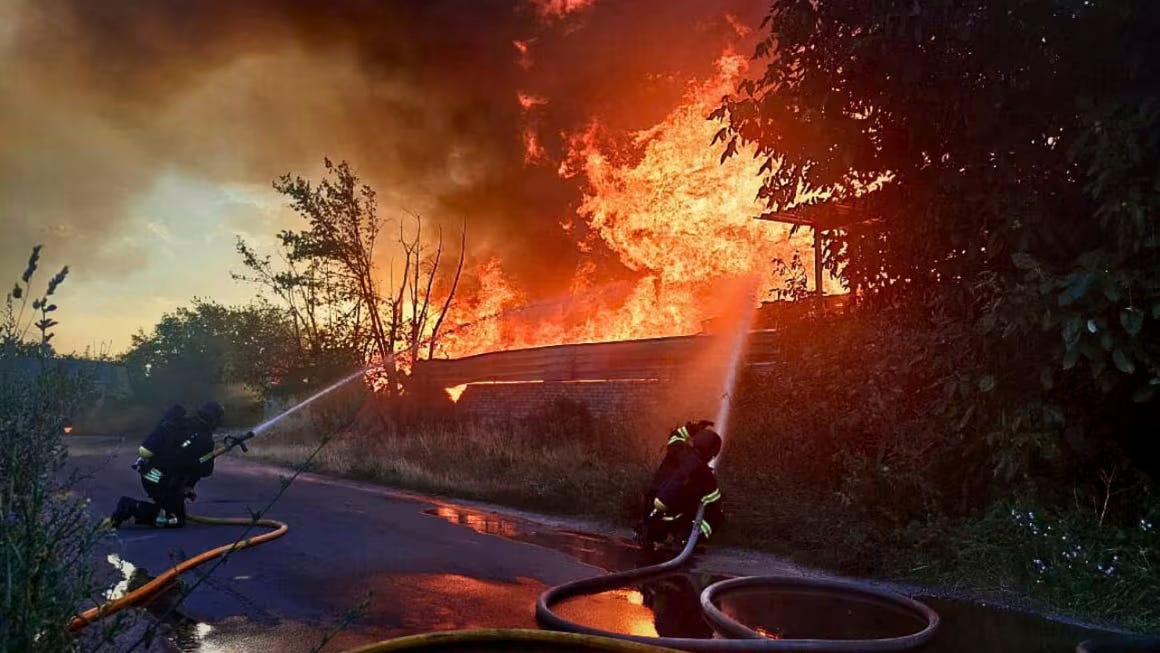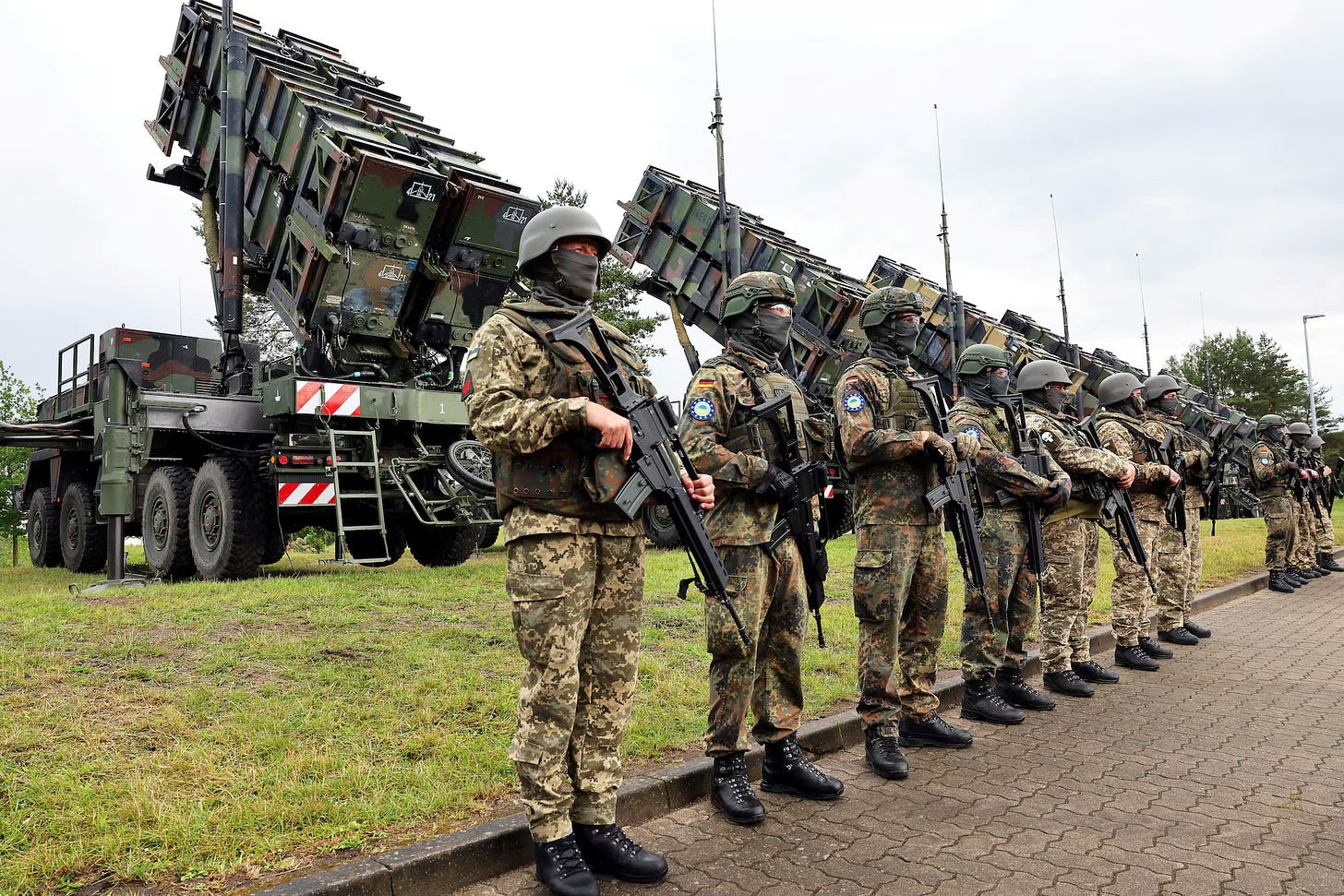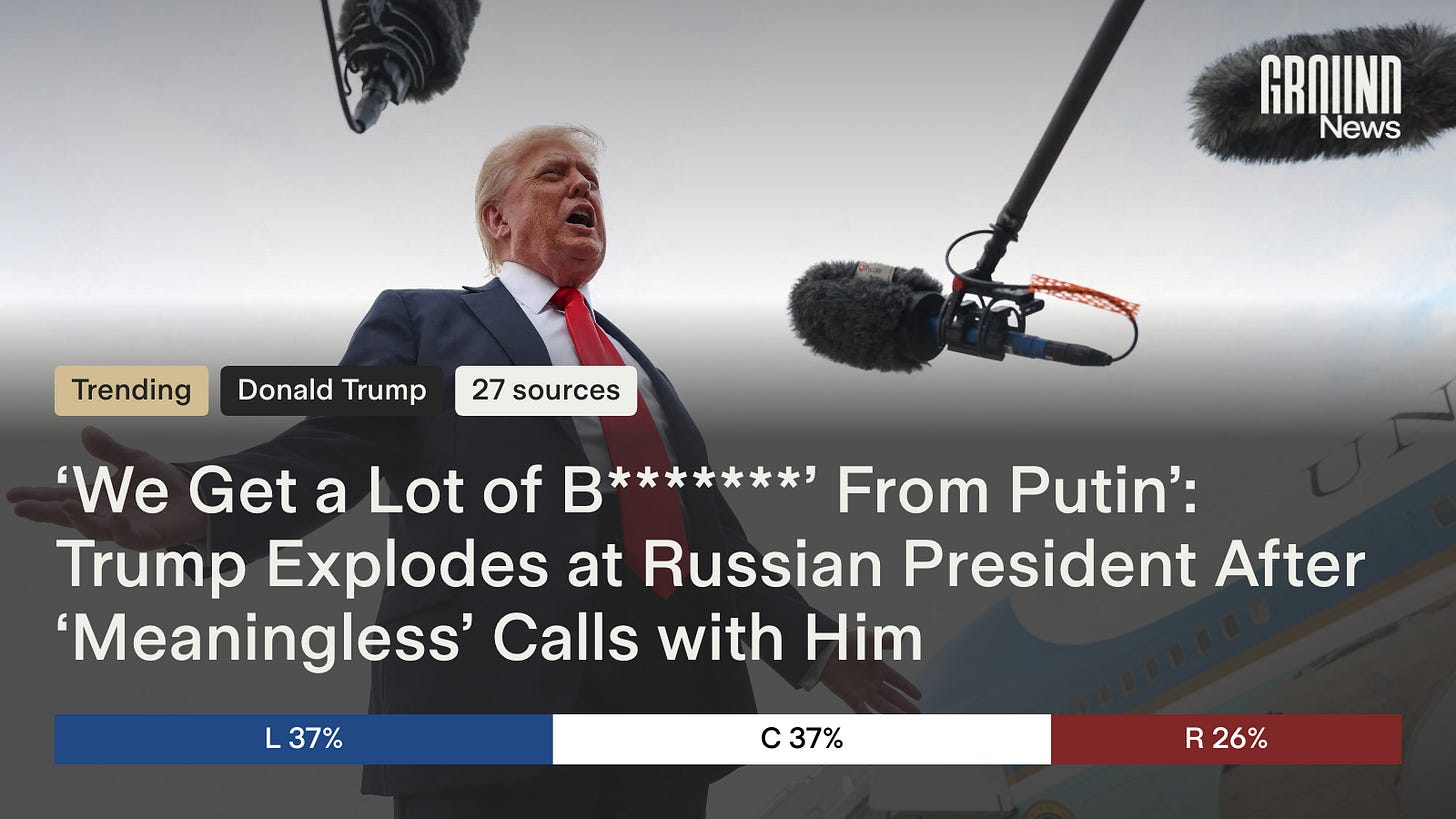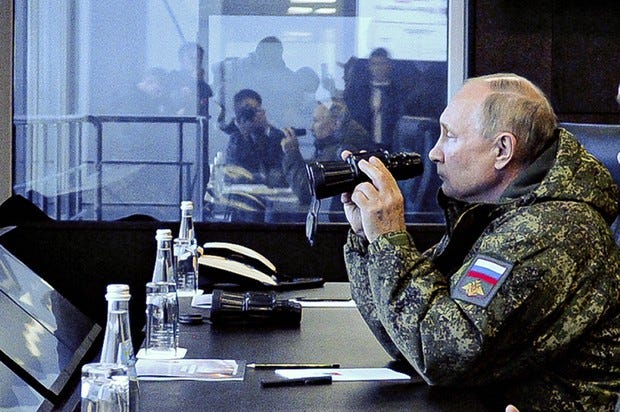Together with:
The moment that seemed to crystallize Donald Trump's about-face on Vladimir Putin came in the first week of July, when his latest attempt at personal diplomacy was answered in the most humiliating way possible. Within hours of their phone call, Russia launched the largest aerial assault of the war, sending 550 attack drones and 11 missiles screaming toward Ukrainian cities.
It didn’t take long for Trump to make his displeasure known. "We get a lot of bullshit thrown at us by Putin, if you want to know the truth,” Trump said. “He's very nice all the time, but it turns out to be meaningless." Within days of the Russian attack, Trump announced a massive weapons surge for Ukraine, gave Putin a 50-day ultimatum for a ceasefire, and threatened 100% tariffs on countries buying Russian oil. It was the beginning of the most dramatic foreign policy reversal of his presidency.
The questions on everyone's minds were: Why is this happening, and why now? After all, Trump had spent years calling for better relations between Russia and the US, even as Russia prosecuted a war of aggression against Ukraine that had caused hundreds of thousands of casualties.
The likely answer comes down to Trump’s wounded pride. Putin’s decision to launch a symbolically huge attack on Ukraine right after Trump had pressed him for a ceasefire was an unmistakable rejection, for all to see, of Trump’s efforts to end the war. Ukrainian President Volodymyr Zelensky said Putin was “publicly humiliating” Trump, a remark more likely to be true simply because it had been made. Trump’s reputation was now on the line. And that probably made all the difference.
From bromance to betrayal
To understand Trump’s pivot on Russia, you have to understand that it was his second. Just months before, America was backtracking on its previous support for Ukraine and in some ways literally switching sides in the conflict. At the United Nations, the US voted with Russia, North Korea, and Iran against a resolution condemning Russia’s aggression in Ukraine. In a wholesale adoption of Putin’s revisionist history, Trump insisted that Ukraine had started the war and called Zelensky "a dictator without elections.”
This was a major change of policy for the US, but it was consistent with Trump’s long embrace of Putin. In 2018, standing next to Putin in Helsinki, Trump was asked whether he believed American intelligence agencies, which said that Russia had attempted to interfere in the 2016 US presidential election, or the Russian president, who denied it. Trump sided with Putin. "He just said it's not Russia," Trump replied. "President Putin was extremely strong and powerful in his denial today."
And Trump had never seemed to have much sympathy for Ukraine. As Moscow declared Russian-separatist regions of the country “independent” and prepared to invade Ukraine in 2022, Trump called Putin's strategy "genius" and "savvy." On the campaign trail in 2024, Trump often maintained that US aid for Ukraine was a waste of resources. Zelensky was “the greatest salesman on earth,” according to Trump, who lamented that “we continue to give billions of dollars to a man who refuses to make a deal.” Trump entered office promising to succeed where Biden had failed. He would use his self-proclaimed dealmaking genius to end the war in "in 24 hours."
Trump had, in other words, committed himself very publicly to the ideas that Putin could be negotiated with and America should seek a reconciliation with Russia. And every time Putin failed to cooperate as planned, he went farther toward proving Trump wrong.
In March, Trump was "very angry, pissed off," at Putin but not ready to say that the bloodshed in Ukraine was Russia’s fault. In April, after a Russian attack on Kyiv, Trump posted "Vladimir, STOP!" on social media, still believing Putin would respond to personal appeals. By May, Trump was calling Putin "absolutely CRAZY" and admitting, "I don't know what the hell happened to Putin."
And when Putin repudiated Trump’s July effort at phone diplomacy by sending a record number of drones to explode in Kyiv, it was finally too much. A years-long relationship built on what Trump had thought was mutual respect suddenly seemed one-sided. "I felt we had a deal about four times," the president told reporters, the wounded pride evident in his voice.
America First meets the First Ego
Trump's shift reveals his "America First" psychology in action: when he feels disrespected, he pivots to policies that make America — and himself — look like winners.
The new weapons surge for Ukraine exemplifies this strategy. European allies will pay billions for American-made weapons that flow to Ukraine, creating jobs in American defense plants while strengthening Ukrainian resistance. The deal includes up to 17 Patriot air defense systems, more than tripling Ukraine's current arsenal of six batteries. Each system costs over $1 billion, generating massive profits for American manufacturers while providing Ukraine with the world's most sophisticated missile defense technology. It's classic Trump: turning foreign policy into a business opportunity.
America imports virtually nothing from Russia, making direct tariffs meaningless, so Trump promised 100% tariffs targeting countries that buy Russian oil, particularly China and India. "I use trade for a lot of things," Trump explained. "But it's great for settling wars."
From Ground News:
Ground News is covering this story like nobody else. Using more than 25 sources, Ground News can separate out the spin from the facts. Don’t know if what you’re reading is coming from a media outlet with an agenda? This is the way to find out.
If you like The Preamble, you’ll love their app and website. It gathers the world’s perspective on the most polarizing issues then breaks down each source’s bias and factuality.
Their Blindspot Feed shows news isn’t always just reported – narratives are crafted by partisan outlets we mistake as “unbiased.”
Ground News is nonpartisan and independently funded by readers like us. And you get 40% off the same unlimited Vantage plan I use.
Subscribe now at ground.news/preamble for $5/month.
As Trump made his announcement, the European Union approved its 18th sanctions package against Russia, slashing the price cap on Russian oil from $60 to $45 per barrel and targeting over 400 commercial vessels that help Russia evade sanctions by selling oil on the black market. European sanctions have already reduced annual Russian oil revenues by €38 billion (about $44.6 billion), with revenues 20% lower in March 2025 than in March 2022. Combined with Trump's threat to put tariffs on buyers of Russian oil, the sanctions package confronts Putin with potential economic strangulation.
This synchronized US and European response is something no one would have expected based on Trump’s prior denigration of Ukraine and skepticism of alliances: coordinated economic and military pressure on Russia from both sides of the Atlantic. For the first time since Trump returned to office, Putin faces a West united against him.
Putin's rejection of Trump's overtures is a breathtaking strategic blunder. For three years, he successfully used time as a weapon, betting that the West would eventually tire of supporting Ukraine and that Trump's return to office would bring accommodation. When Trump won in November, Putin had every reason to believe his patience would be rewarded—and initially it was. Trump gave Putin everything: the UN vote against Ukraine, the blame for the war that he placed squarely on Kyiv, even talk of visiting Moscow and thus reducing Putin’s diplomatic isolation.
But with the air assault in response to Trump’s peace overture, Putin overplayed his hand catastrophically, triggering something he clearly hadn’t anticipated: the alignment between Trump's ego and America's strategic interests. Putin deeply misunderstood the psychology of someone who cannot bear appearing weak. By making Trump look foolish on the world stage, Putin transformed his most valuable de facto ally into a determined adversary.
The test ahead
But whether this moment represents a genuine turning point depends on factors beyond Trump's wounded pride. The weapons surge provides Ukraine with defensive capabilities that could blunt Russian offensives, but it doesn't address Ukraine's fundamental disadvantage in manpower and industrial capacity.
Economic pressure could be more damaging to Russia, but only if sustained over time. Putin may now be calculating that he can outlast Trump's attention span, as previous ultimatums have consistently failed to be enforced.
Since taking office, Trump has repeatedly threatened sanctions and tariffs on Russia "at any moment" unless Putin struck a deal "soon." In March, he threatened secondary tariffs on Russian oil if Moscow thwarted ceasefire negotiations. In May, European leaders issued Putin a two-day ultimatum for an unconditional ceasefire after a Trump phone call, which produced only vague promises of future negotiations. Despite Trump's occasional public rebuke — threatening to deal with Putin "differently, through 'Banking' or 'Secondary Sanctions'" — there has been no follow-through. The Kremlin has been able to deflect or sidestep whatever pressure it's faced, and it seems confident that it will continue to do so.
The next seven weeks, leading up to Trump’s 50-day deadline, will determine whether the president’s about-face is a genuine strategic transformation or merely another chapter in his presidency.
Trump's gamble is that Putin, facing potential economic collapse, will choose negotiation over continued escalation. Putin has kept testing Trump's resolve, launching hundreds of drones on several nights since Trump announced the ultimatum.
But Trump’s credibility is staked on this confrontation in ways that make retreat difficult. Having publicly called out Putin's deception, threatened specific economic consequences, and agreed to arm Ukraine with American weapons, Trump has created expectations that will be hard for him to abandon without looking weak again.
That’s why this time could be different. Putin isn't just facing another American president's threats. He's facing a man angry that he was played before the world for a fool. That kind of wounded pride doesn't heal easily, and it may prove more durable than any policy position Trump has ever held.






